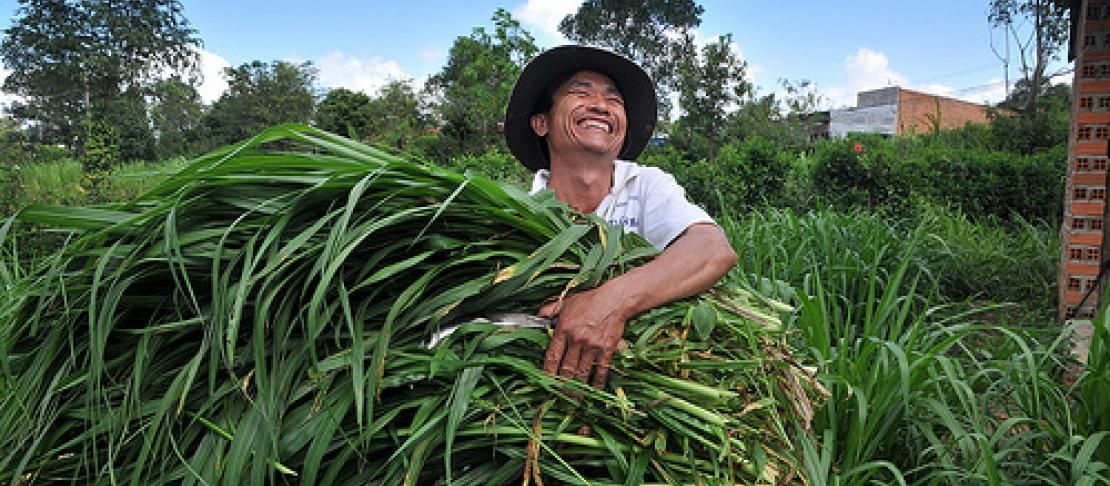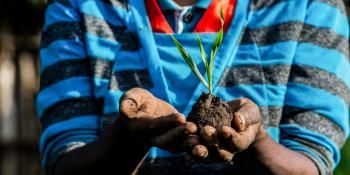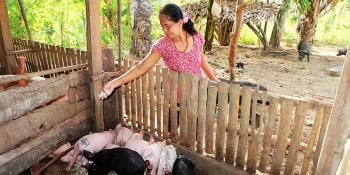Leaders address the complexities of global food security

by Caitlin Corner-Dolloff
Climate change will cause agricultural and livelihood challenges across the globe. With farmers in many areas already experiencing the effects of unpredictable weather and drought, action is needed immediately. In the light of this alarming issue, leaders from around the globe recently gathered in Vietnam, Hanoi at the Second Global Conference on Agriculture, Food Security and Climate Change (also called “Hunger for Action”) to discuss solutions. Representatives from over 150 countries joined the conference, together with Heads of State, Minsters, and and various international and regional organizations, civil society, and the public sector. In total the conference attracted almost 500 participants, all eager to join in and help create a food secure future.
The conference, which was co-organized by Viet Nam and the Netherlands, in close collaboration with the CGIAR Research Program on Climate Change, Agriculture and Food Security (CCAFS) and the Food and Agriculture Organisation (FAO), among others, emphasized the increasing challenges to achieving global food security.
His Royal Highness Prince Charles of Wales, representing his charity project the International Sustainability Unit (ISU), noted in his video address:
“food security is the most vital issue on the international agenda [...] Those simple two words food security hide a massive complexity that we are just starting to understanding”.
Indeed, the complexity rising is due to the linkages between climate change, poverty, and sustainable development, raising the importance of agriculture policies and specifically climate smart agriculture (CSA) practices in addressing mitigation and adaptation.
Farmers first
Mary Robinson, former President of Ireland and United Nations High Commissioner for Human Rights, emphasized that “the needs of smallholder farmers are the starting point” to the discussion on climate smart agriculture. In her video keynote address she called for a “people centered approach” that includes “meaningful engagement with farmers and beneficiaries”. Considering farmers in policy planning is not enough, they must be actively included to ensure their concerns and realities are met. View Mary Robinson speech held at Agriculture and Rural Development Day (ARDD) at Rio +20 earlier this year.
Creating partnerships for food security
Engagement with famers must happen at scale to achieve the level of change needed in the global agricultural system. This requires new partnerships. The Prime Minister of Viet Nam, Nguyen Tan Dung in his opening ceremony address stressed the importance of partnerships such as those between nations, partnerships with international organizations, public private partnerships, and collaboration with civil society and farmers to move countries vulnerable to climate change forward in this fight for food security. This is especially crucial in Viet Nam as it is one of the top five nations to be impacted by climate change.
In a working group moderated by the World Economic Forum, government leaders sat down with companies, banks, and financers to brainstorm how countries can establish public private partnerships to assist in getting finance for CSA. Government officials from Viet Nam also commented that they wanted the private sector partnering with the government and farmers throughout the entire value chain.
New and old, partnerships, planning and investment must strategically reach across multiple sectors. “Urgency, uncertainty, and complexity” were highlighted by Dr. Thomas Rosswall, Chair of the Independent Science Panel for CCAFS, in his keynote address as being at the heart of current challenges to food security and sustainable development. The interlinked drivers of change require novel coordination between the different components of agricultural system. Ralph Aston, Director of the Australian Future Project, reiterated in his keynote address that “while the direction we must head in is clear, much of the path and ways of working together are new,” and we must act now and create new cross-disciplinary processes even if this does not lead to success every time.
Integrating knowledge
There is already a wealth of knowledge that can be drawn on immediately to adapt and eventually transform the agricultural system – it just needs to be brought together in a way policy makers, researchers, farmers, and other stakeholders can use. Vice Minister of Agriculture for The Netherlands and Co-Chair of the conference, Hans Hoogeveen, noted that “we are talking about a knowledge based approach.” He continued, “let us not forget we are rich in traditional knowledge, we need to include this.”
Famers, such as Brylyne Chitsunge from South Africa, emphasized that there is a disconnect between what is known globally and what information is accessible to farmers on the ground. One of the working groups reported back that due to the challenges of climate change adaptation we must “give farmers knowledge, not recipes, and tools so they can make their own decisions.” The conference provided an important opportunity for enhancing the knowledge exchange between key stakeholders in the formulation of the climate-smart agriculture platform, and Brylyne called all present to “ensure that these messages get across to the rural settings where farmers there will greatly benefit.”
Transforming the system
Dr. Andy Jarvis, Leader of CCAFS Theme 1: Adaptation to Progressive Climate Change and Director of the Decision and Policy Analysis (DAPA) Research Area at the International Center for Tropical Agriculture (CIAT), presented the shocking statistic that 31% of the world will have novel climates in the future and some climates will disappear. And this is coupled with the fact that the world will need to produce 60-70% more food by 2050 if we are to make global demand. How can the world work together to help farmers do this?
Farmers are already adapting. The CCAFS Farms of the Future project is using climate analogues to help farmers see what their future climate will be to assist then to adapt in the ‘right direction’ and to gain a better understanding of barriers, the biggest barrier being poverty. Farmers though have reported back that they are concerned about having the capacity to make the changes required. We need to boost farmers’ adaptive capacity, but in the long term that won’t be enough. We need to think beyond incremental change and transform the global agricultural system.
Policy for change at scale
Working with new partners, across sectors, and towards transformation is a starting point, but we need a framework. Dr. Nguyen Van Bo, President of the Vietnamese Academy of Agricultural Sciences and a member of the Commission on Sustainable Agriculture and Climate Change, highlighted how transforming the agricultural system requires policies and incentives at multiple levels of governance, with strong policy globally and nationally, echoing a key recommendation from the Commission.
Dr. Bo emphasized there is “no one size fits all” solution to adaptation and mitigation challenges, so policy actions must address both landscape level concerns and local contexts simultaneously. Drivers and barriers to system change across levels, such as social constraints facing farmers and changes needed to livelihoods, must therefore be clarified along with an understanding of the priorities for adaptation at multiple levels. Most importantly, we must be clear about our overall goal and vision for the future of the agriculture system.
Investing in agriculture
A vision that is a list of adaptation options, while crucial, isn’t enough – we also need to understand the costs and benefits. Ralph Ashton called for a strong ethical approach to priority setting and investment decisions, emphasizing transparency, honesty, and fairness when identifying tradeoffs and openly addressing the reality that “not everyone will win.” Dr. Bo and the Commission called for long-term investments in agriculture for poverty reduction and environmental sustainability.
Moving forward
The final outcome of the conference was the Hanoi Communique summarizing the key points of action for climate smart agriculture to be pursued internationally, especially within existing national and international policy frameworks. The Communique emphasizes looking to the future towards new approaches with new partnerships that can enable all stakeholders to play crucial roles in creating enabling environments for addressing food security, poverty, climate change, and environmental sustainability in ways that put farmers first.
Read additional reports back from the conference:
Lessons from Hanoi: The Imperative of Implementing Climate-Smart Agriculture - World Bank Blog
Making agriculture ‘climate smart’ - WorldAgroforestry Blog
News reporting from the conference:
Sustainable farming key to food security | VietNam News
This blog post was written by Caitlin Corner-Dolloff, Researcher in the Decisions and Policy Analysis (DAPA) Research Area in the International Center for Tropical Agriculture (CIAT) based in Hanoi, Vietnam. For more global event updates follow CCAFS on Facebook, and Twitter @Cgiarclimate.



